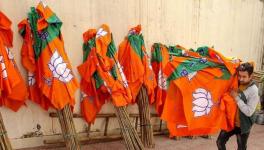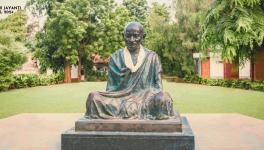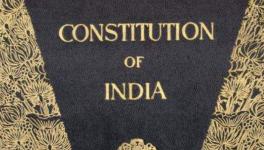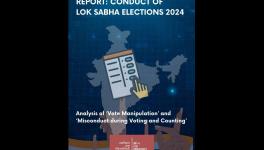Awaiting ‘Development’, Tribals Of South Gujarat Mull Boycotting Polls
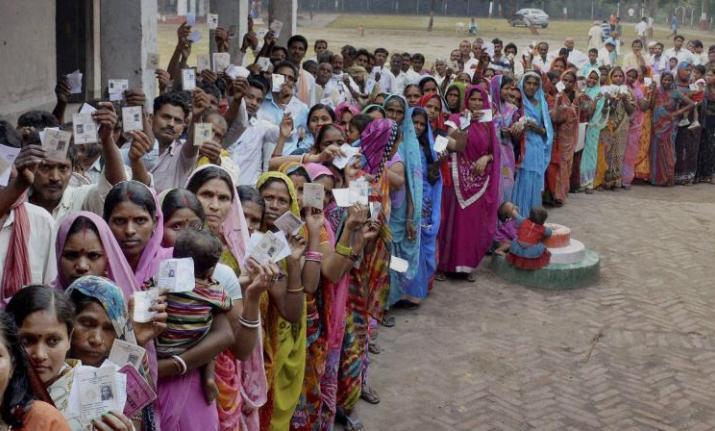
Representational image. | Image Courtesy: India Tv News
Every week, Jainaben Gamit, a tribal woman from Jhakri village of Tapi district in South Gujarat, walks for about 3 kilometres towards the forested area surrounding her village to chop wood. After she is done chopping, she carries one bhara—about 20 to 25 kilograms—of chopped wood back to her village to be used for cooking in her earthen chulha. Jainaben like most women of the village cannot afford LPG cylinders and buys only one or two cylinders a year. Gujarat government’s much touted ‘model of development’ eludes the tribals villages of South Gujarat where people are still waiting for basic amenities, source of employment and a patch of land to call their own.
“LPG is costly and its price has been increasing every year. Most of us cannot afford LPG cylinder at all. Some families buy one or two cylinders a year but rest of the year, all women of the village chop wood and cook in chulha,” Jainaben Gamit told Newsclick.
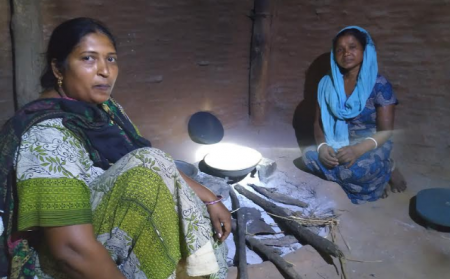
Women cook on chulha in tribal areas of South Gujarat
“Electricity supply is not consistent around here. It is disconnected since morning today. Most days the supply stops in the morning and resumes in the evening, but at times we don’t have electricity supply for days,” says Jainaben, while working in the kitchen in torchlight.
“Despite inconsistent electricity supply, electricity bill is always as high as Rs 1,000 which we cannot afford. So on most days, we hardly put on the light and try to finish work before dusk,” tells Karunaben, another tribal woman of Jhakri.
Tribals form about 15 per cent of the total electoral population of Gujarat. Tribal population is spread across South and Central Gujarat, they from a decisive vote bank in 8 Lok Sabha constituencies. Apart from four seats that are reserved for schedules tribe—Chhota Udaipur, Dahod, Bardoli and Valsad—tribal population holds sway in Sabarkantha, Banakantha, Bharuch and Panchmahal Lok Sabha seats.
In 2014 Lok Sabha polls, the BJP, which had won all 26 seats in Gujarat, had grabbed Bardoli, Valsad and Dahod from the Congress, which had won the three Lok Sabha seats in 2009 elections. However, in the assembly elections in December 2017, the Congress won 15 out of 27 assembly seats in the tribal region, Bharatiya Tribal Party (BTP) had won two seats while one went to an independent candidate.
Also read: Junagadh: BJP Banks on ‘Modi wave’, Congress Wishes to Repeat 2017 Assembly Poll Performance
While the primary demand of tribals remain, education, employment, basic amenities, health care and rights over forest land and irrigation facility, the Congress is trying to woo them with the promise of ‘Nyay’ — Nyuntam Aay Yojna. The BJP, on the other hand, is primarily building up a narrative of nationalism and national security.
“Desh khatre mein hai isiliye baki sab bhul kar desh hit ko soch kar vote karo (Our country is in danger, so forget everything else and vote for the sake of the country),” said a local BJP leader of Vyara, Tapi district, while tribal youths were trying to put forth their issues.
“The BJP has not done any vikas (development), it has just brought vinash (destruction) of tribals. The party representatives cannot claim to have done any developmental work, hence they go around claiming the nation is in danger and Hindus of the nation is in danger,” says Viral Konkani, a young tribal activist from Tapi.
“The tribals of the state are fed up with both the Congress and the BJP. No political party has done anything for the tribals,” adds Konkani.
“We ran from pillar to post with memorandums requesting basic amenities like water but nobody heard us. If tribals don’t matter why should we vote at all? We are thinking of boycotting elections,” said Nalinbhai Sanabhai Patel, a tribal from Umra village, Olpad taluka, Surat.
“Whether it is the demand of jal, jungle and zameen (water, forests and land), rehabilitation of the displaced tribals, health or education, no mainstream political parry is speaking about the issues or have included these in their manifesto ahead of the Lok Sabha polls. Even the opposition has not made a clear stand on issues like displacement of tribals due to Sardar Patel Statue and Bharatmala project or the recent order of Supreme Court on the possible eviction of about 11.8 lakh tribals, whose claim for right over forest land was rejected under the Schedule Tribes and Other Forest Dwellers (Recognition Forest Rights) Act 2006,” says Romel Sutaraiya, a Gujarat-based tribal rights activist to Newsclick.
Notably, the Gujarat government on March 27 filed a review petition in the Supreme Court about the fate of 13,175 tribals families of Gujarat who stand the risk of eviction in accordance with the Supreme Court order.
Also read: SC Stays Order Directing States To Evict Persons Whose Claims As Forest Dwellers Were Rejected
“Since the Forest Rights Act has been implemented in Gujarat, about 1 lakh and 84 thousand tribals have claimed land under the Act till the year 2011-12. However, 1 lakh and 13 thousand claims were rejected by the Gujarat government, out of these some approached the High Court and later got their land claims approved,” says Sutariya.
“Even though the Act came into effect from the year 2005, tribals are yet to get a patch of land that they can call their own. Tribals who fought a legal battle to have their land claims approved by the High Court have been given lesser land than what they claimed,” Sutariya adds.
Savitaben, a tribal woman of Umarpada taluka in Surat district had claimed 6 acres of land but Gujarat government has allotted her only 40 Are (less than an acre) land.
“The FRA states that up to 10 acres land can be given to tribals under the Act but Gujarat government is yet to allot more than 2 acres of land against each claim,” tells Sutaraiya.
“Ownership of jungle zameen (forest land) is our primary concern. We have been living here for generations, yet neither does my family have any document of ownership of the house nor do we own land to cultivate and feed our family. Forest Officers harass us if we cultivate in our land in the village since it is declared as forest land,” says Maheshbhai Gamit of Rani Amba village.
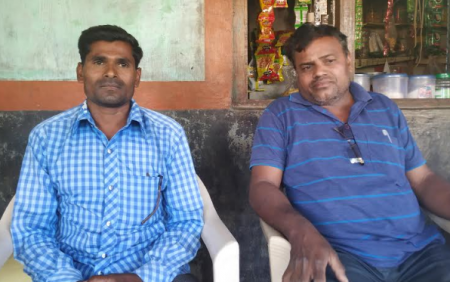
Maheshbhai Gamit of Rani Amba village
“The Umra river that used to be our primary source of water has dried up. We never had scarcity of water until Gujarat Government built a dam in the area and then canals to draw water to industries around the state,” tells Gunjan Patel from Mahua taluka.
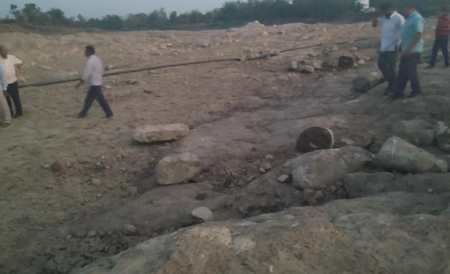
Umra river , completely dry
“The government had assured that the canal will also bring water to 23 villages for drinking and irrigation, but we don’t even get sufficient drinking water,” says Kaushikaben, Sarpanch of Umra village.
Get the latest reports & analysis with people's perspective on Protests, movements & deep analytical videos, discussions of the current affairs in your Telegram app. Subscribe to NewsClick's Telegram channel & get Real-Time updates on stories, as they get published on our website.










